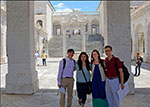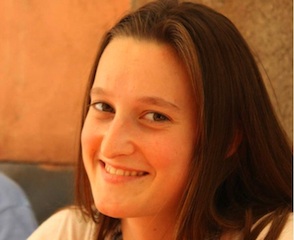![]()
Name: Ann Gallagher
E-mail: agallag3@nd.edu
Location of Study: Rome. Italy
Program of Study: Living Latin in Rome
Sponsors: Nanovic



![]()
A brief personal bio:
Raised in Little Compton, Rhode Island, I attended a local, boarding high school. There, I was required to study a full year of Latin. After that mandatory year, I found that my fascination with the puzzle-like language increased as I began to translate the works of Cicero, Ovid, and Vergil. My love for Latin eventually found me here – a freshman at Notre Dame, declaring the Classics Major. I look forward to my next three years and hope to enhance my work in the Program of Liberal Studies with an understanding of the Ancient Greek and Roman civilizations and languages.
Why this summer language abroad opportunity is important to me:
This SLA Grant enables me to receive a rare training in the spoken dimension of the Latin language. The mastery of language usually requires proficiency in reading, writing, and speaking. However, most Latin students are unable to receive any formal training in the spoken or written aspects. This program will not only introduce me to the crucial, missing dimensions of speaking and composing Latin, but it will also aid my ability to translate Latin texts. This is a training that I will be able to build upon and benefit from during my coming years at Notre Dame. By practicing Latin composition, I will learn the phrases and patterns of common speech and will be able to recognize them in the texts that are translated in the classroom. This will significantly aid my speed and accuracy for capturing the spirit of translation.
What I hope to achieve as a result of this summer study abroad experience:
The benefits of the “Living Latin in Rome Program” are practical and tangible. The ability to converse in Latin will increase my vocabulary in a far more effective and efficient manner than standard, memorization techniques. Furthermore, conversational Latin will significantly improve my ability to translate and contextualize the ancient writings which I will read in Notre Dame’s classrooms for my next three years. It will enable me to recognize the subtle uses of phrases and words unique to every spoken language. Finally, I am confident that my appreciation for Latin will grow immensely through this experience. If I should become a Latin teacher, it is necessary for me to cultivate not only a proficiency in the language, but also my love for the language and the culture in which it was spoken. This program will certainly help me do so by tying my love and knowledge of Latin to the physical remains of the Roman world.
My specific learning goals for language and intercultural learning this summer:
- By the end of this summer, I will be able to hold an informal conversation in Latin.
- By the end of this summer, I will be able to be able to understand Latin sight-passages without a dictionary
- By the end of this summer, I will be able to participate in a Tridentine Mass without the aid of the translation missal.
My plan for maximizing my international language learning experience:
Through the “Living Latin in Rome” program, I will be in class for 10 hours each week and on organized site-visits for an additional 20 hours each week. In this way, the program will help me to integrate my growing understanding of the Romans’ language with that of their culture and way of life. Outside of the program, I also hope to immerse myself in the Roman world by attending daily Latin Mass in The Chiesa di Santa Trinita dei Pellegrini. Finally, I hope to attend parts of the Augustan Text and Monument Conference being held in Rome by Notre Dame’s Professor Sarah Murray. This conference, to be held from June 30 to July 3, will further engage me with the living, ancient history of Rome around me.
![]()
Reflective Journal Entry 1:
Reflective Journal Entry 2:
Salvete amici! I cannot believe that I have already been here for two full weeks! Life in Rome is fast-paced and this program certainly keeps us busy! One of my favorite trips during the past week was to Ostia Antica – the ancient harbor city of Rome. We found the building in which St. Monica had likely died and spent over an hour there, translating St. Augustine’s account of her death in the Confessions. We were also able to visit the Villa Borghese and see the famous Bernini statues of David and of Daphne and Apollo after reading the Vulgate and The Metamorphoses’ versions of these stories. At the end of the week, we traveled to Naples to see Pompeii, Cumae, and Mount Vesuvius. In the city of Pompeii itself, we swore to speak nothing but Latin while we found our way among the ruins. It was a difficult experience, but also an exciting and a rewarding one! The “Living Latin in Rome” program is emphasizing sight-passages so much more than any of my previous Latin classes have ever done. But I am finding that the more I practice, the more confident I become. It has also been very helpful to compose my own sentences in Latin using new vocabulary that I encounter in the sight-passages. It makes the process of memorization so much more efficient when I remember the context in which I, myself, used the words. For that reason, I have also started keeping a journal of our daily adventures in Latin. I am looking forward to another exciting week beginning bright and early tomorrow! Valete!
Reflective Journal Entry 3:
Salvete amici! It shocks me to think that today is July 1st already! I have now been here in Rome for just over three weeks! I am feeling so much more at home in the city; I have had to pull out my map fewer and fewer times recently! Last week was chalk-full with incredible site-visits and new Latin inscriptions, literature, and conversations. On Tuesday, we were given special access to the Theater of Maecenas – where Vergil, Ovid, and Horace likely recited their own poetry to Maecenas. There, we translated and recited several of Horace’s poems in his beautiful meter. It was incredibly thrilling to stand in that small theater, chanting Horace’s poetry just as he once did! On our long trips of the weekend, we traveled to Montecassino, Fossa Nova and the Via Appia. The first two sites – the places of St. Thomas Aquinas’ early education and his death, respectively – were dedicated to the readings of this great theologian’s works. The sites themselves were breathtakingly beautiful and peacefully withdrawn from the bustle of Rome itself.
I am becoming so much more confident and enthusiastic with the spoken dimensions of Latin. In the classroom every afternoon and even while reading on site-visits, we interact with our text by drawing on its vocabulary or grammatical constructions to create our own sentences. Every Tuesday and Thursday evenings, we break into small groups to converse for an hour in Latin. There, we play games and speak freely in Latin for the sake of practice. I am beginning to really enjoy the composition dimension that I had never attempted before this summer. I am even tempted to seek out a Latin composition course at Notre Dame when I come back next semester! As we read in the official Latin Encyclical written by Pope John XXIII, Veterum Sapientia:”Cum invidiam non commoveat, singulis gentibus se aequabilem praestat, nullius partibus faveat, omnibus postremo sit grata et amica.” He expresses perfectly the way in which the Latin language belongs to every human person simply because no one race or person in particular claims it as their own! As I begin to write and speak in Latin, I am simply sharing in an ancient and universal tradition of language and culture!
Valete (for now!)
Ann
Reflective Journal Entry 4:
Salvete omnes! The end of my adventure is swiftly approaching; I can honestly say that I never anticipated how upsetting that idea would end up being. The weeks have been flying by and as I become more and more comfortable with the language, reading and speaking Latin become even more exciting. Among the most recent site-visits, my favorites include a day-trip to Lake Nemi and the Scavi Tour of the Necropolis under St. Peter’s Basilica. The first was an incredibly beautiful spot where we read the Latin about and saw the replicas of Caligula’s “Pleasure Barges,” which were discovered at the bottom of the lake. On Monday, we were guided in small groups on the Scavi Tour. This was a special treat since the tickets are usually booked months in advance! We were able to walk below the current basilica among the foundations of Constantine’s original basilica and through the ancient burial tombs of the Necropolis. The tour brought us closer and closer to the tomb of St. Peter where some of the first Christian symbols of burial could be seen. The entire tour was incredible! It is amazing what we can understand about a culture and its beliefs based on the artwork, design, and customs of their burials and burial chambers! We discovered this in greater depth on another visit to the Catacombs several days later.
Although our classes have officially ended now, one great tradition remains! In just a few more hours, our group will gather in the Ancient Roman Forum and with each person having memorized a portion, we will recite Cicero’s entire third oration against Cataline. We will take turns delivering our pieces from the very Rostra from which Ciero would have delivered that speech himself! Mirabilis visu et auditu!
Wish me luck in my first Latin recitation!
Valete!
Reflective Journal Entry 5:
Reflective Journal Entry 6:
![]()
Reflection on my language learning and intercultural gains:
Reflection on my summer language abroad experience overall:
How I plan to use my language and intercultural competences in the future:

Salvete, omnes! I have been in Rome for nearly one week now. I am very excited for what the “Living Latin in Rome” program has in store this summer. We jumped straight into classes on Sunday and I can already tell that this is going to be an incredibly helpful course. There are 36 students, ranging from beginners to Latin teachers. But for each of us, the spoken dimension of Latin is completely new. We have been split into three groups and assigned two teachers. I have been placed in the intermediate level with eleven others. One of my two teachers is actually a ‘Latinist’ for the Pope!
The main approach to learning Latin in the course is through extensive sight-passages (that is, texts we have not seen or prepared for in advance) and conversation. I have never been very confident about either of these dimensions of the language. Unfortunately, most Latin classrooms only focus on prepared translations. But even after these few days, I know that if I challenge myself to compose my own thoughts in Latin, I will become faster at recognizing grammatical constructions and much more familiar with the flow of the language. Being asked to make my own sentences in Latin helps me to understand the thoughts and patterns used by the authors we read. I have a long way to go yet, but I am very excited for this journey!